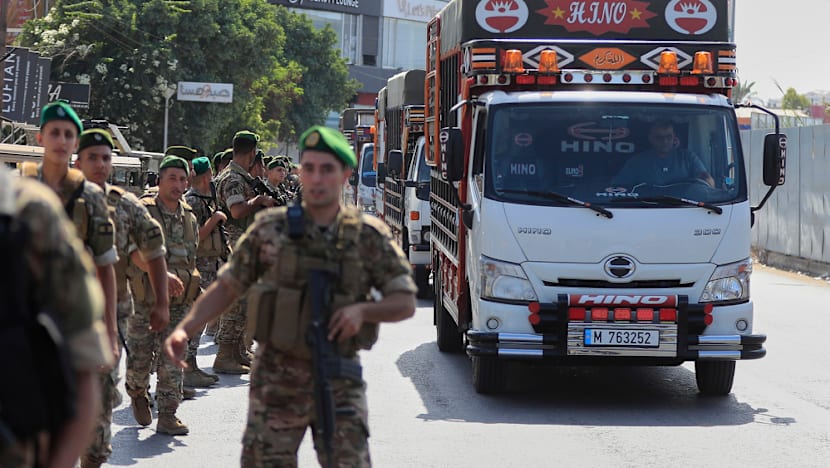Politics
Palestinian Factions Transfer Weapons in Lebanon’s Refugee Camps

Palestinian factions in two refugee camps in Lebanon transferred significant quantities of weapons to authorities on September 13, 2023. This handover aligns with an agreement established earlier in the year aimed at removing arms not under the control of the Lebanese state. The latest deliveries occurred in the Ein el-Hilweh camp, the largest of its kind in Lebanon located near the southern port city of Sidon, and the Beddawi camp near Tripoli.
According to the state-run National News Agency and a spokesperson for the Palestinian factions, three trucks filled with weapons from Beddawi were dispatched to a Lebanese army barracks in Tripoli. Abdul Hadi al-Assadi, spokesperson for the Palestinian National Security Forces in Lebanon, confirmed that five additional truckloads were handed over in Ein el-Hilweh. He noted that these weapons belonged to factions affiliated with the Palestine Liberation Organization.
Background on the Arms Handover
The handover of arms has been a gradual process since it began last month, with previous transfers occurring in various Palestinian refugee camps located in Beirut and the southern province of Tyre. The context surrounding these actions is crucial; the twelve Palestinian refugee camps in Lebanon operate largely outside of Lebanese state control.
Ein el-Hilweh, which is home to approximately 75,000 residents, includes militant Islamic groups that are not participating in the current arms transfer agreement. Tensions within the camp have been high, as evidenced by clashes between members of Palestinian President Mahmoud Abbas’ Fatah faction and rival Islamist groups, which claimed the lives of 30 individuals and resulted in hundreds of injuries in 2023.
Living Conditions and Legal Status of Palestinian Refugees
Palestinian refugees in Lebanon, along with their descendants, do not receive citizenship, a situation that is ostensibly intended to preserve their right to return to the homes they were forced to leave during the 1948 creation of the state of Israel. This legal status restricts their ability to work in numerous professions, including medicine and finance.
Moreover, limitations on property ownership further complicate their situation. Many refugees are compelled to purchase property under Lebanese names, putting them at risk of embezzlement and expropriation. These systemic challenges contribute to the ongoing struggles faced by Palestinian communities in Lebanon, underscoring the complexities surrounding both their political situation and their day-to-day lives.
As the arms handover continues, the implications for security and stability in the region remain to be seen, particularly given the historical tensions and the precarious status of Palestinian refugees in Lebanon.
-

 Lifestyle3 months ago
Lifestyle3 months agoHumanism Camp Engages 250 Youths in Summer Fest 2025
-

 Sports3 months ago
Sports3 months agoDe Minaur Triumphs at Washington Open After Thrilling Comeback
-

 Business4 months ago
Business4 months agoKenvue Dismisses CEO Thibaut Mongon as Strategic Review Advances
-

 Sports4 months ago
Sports4 months agoTupou and Daugunu Join First Nations Squad for Lions Clash
-

 Top Stories4 months ago
Top Stories4 months agoColombian Senator Miguel Uribe Shows Signs of Recovery After Attack
-

 World4 months ago
World4 months agoASEAN Gears Up for Historic Joint Meeting of Foreign and Economic Ministers
-

 Business4 months ago
Business4 months agoOil Prices Surge Following New EU Sanctions on Russia
-

 Entertainment3 months ago
Entertainment3 months agoDetaşe-Sabah Violin Ensemble Captivates at Gabala Music Festival
-

 Health3 months ago
Health3 months agoNew Study Challenges Assumptions About Aging and Inflammation
-

 Entertainment3 months ago
Entertainment3 months agoBaku Metro Extends Hours for Justin Timberlake Concert
-

 Business4 months ago
Business4 months agoU.S. House Approves Stablecoin Bill, Sends to Trump for Signature
-

 Top Stories4 months ago
Top Stories4 months agoRethinking Singapore’s F&B Regulations Amid Business Closures









